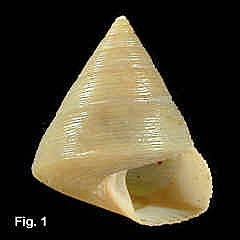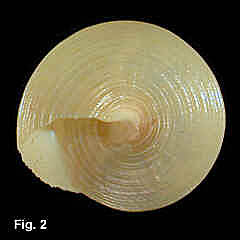|
|
|
|
Calliostoma legrandi (Tenison-Woods, 1876) Description: Whorls straight sided, suture indistinct. Sculptured with about eight smooth spiral ribs on each whorl, about the same width as interspaces; sometimes with a single finer rib between. Basal margin sharply angled. Base flat, sculptured similarly to whorls. Columella smooth, curved; outer lip thin with external sculpture showing through, thickened internally at base in mature shells. Umbilicus closed. Exterior colour fawn, columella white. Interior nacreous. Size: Up to 14 mm high, 12 mm wide. Distribution: Endemic to Australia; Sydney, NSW, to Eyre Peninsula, SA, including Tas. Habitat: Taken in 5-570 m; occasionally found as a beach shell. Rare in NSW. Comparison: This species has smooth spiral ribs, in contrast to the beaded ribs of C. comptum. Calliostoma excultum (Iredale, 1931), known only from the holotype (type locality: off Disaster Bay, NSW, in about 50 fms), is close to C. legrandi, but differs by having more numerous spiral threads and by having red-brown dashes on some of the threads of the last whorl. Figs. 1,2: Off Twofold Bay, NSW, in 73 m (C.388727) |

